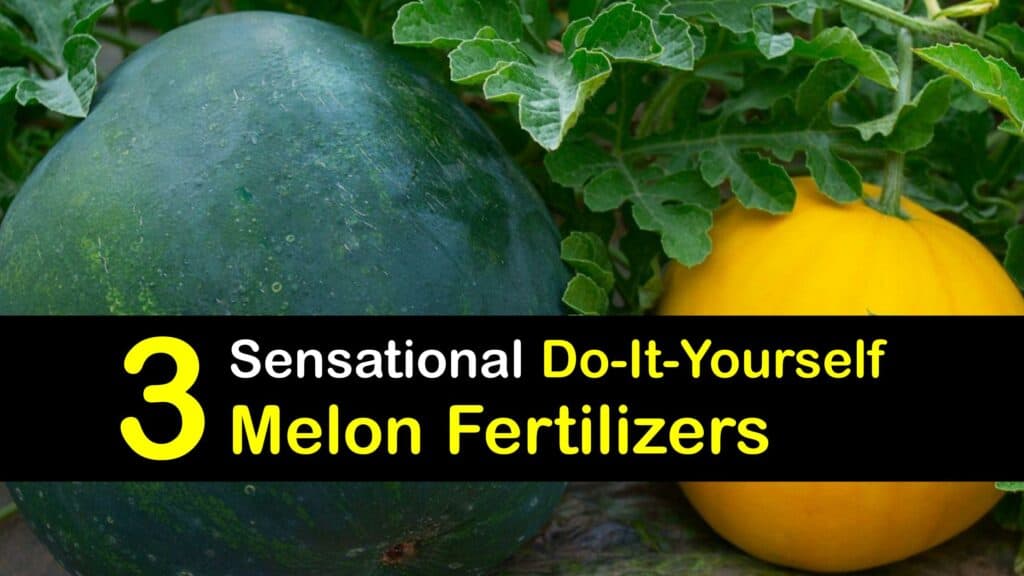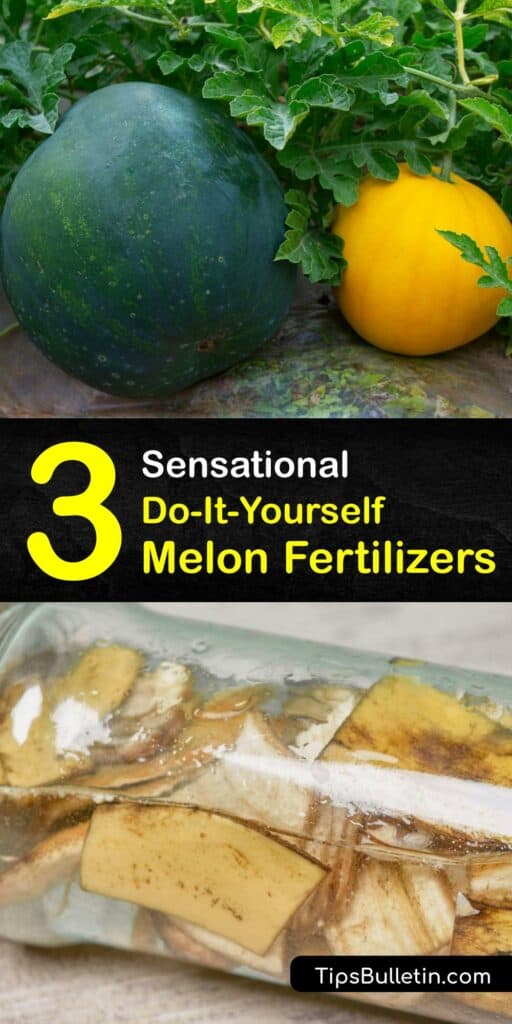Gardeners raise fruit crops such as melons to enjoy delicious, high-quality fruit free from pesticides and synthetic fertilizers. Homemade fertilizer for melons helps you to produce the biggest, tastiest melons. Treating your crop with an organic melon plant fertilizer is a clever way to improve the vigor of your plants and give them all the nutrients they require to grow and bear fruit.
Melons are heavy feeders. It doesn’t matter if you’re growing muskmelon, cantaloupe, honeydew, or watermelon; the fruit will taste best if the soil is fertile. Find out how to fertilize melons using simple homemade fertilizers.
Store-bought fertilizers are costly and often contain toxic chemicals. Save money and avoid potentially dangerous substances by mixing fertilizer. Use Epsom salts and banana peels, or start a compost pile. Growers who can blend their own organic fertilizer save money and time and keep synthetic compounds out of their food crops.

Craft Your Own Organic Melon Plant Fertilizer
As interest in natural management like companion planting grows, more gardeners want to know methods to make homemade fertilizer for cantaloupe and melons. Many store-bought fertilizers are packed with chemicals.

Finding out how to fertilize melons using DIY techniques allows you to choose what substances you use in your food. Whether you’re growing cantaloupe or tomato plants, blend fertilizer and regain control of your garden this growing season.
Types of Melons to Fertilize
As you purchase melon seeds, there are several varieties to choose from. Most popular types of melon thrive when fertilized.
Whether you have a soil test with deficiencies or want to support your growing melons, melon plant food encourages more plant growth. Using granular fertilizer or liquid fertilizer increases resistance to pests such as the cucumber beetle and powdery mildew and improves fruit quality.
Homemade Fertilizer for Melons Using Epsom Salt
Epsom salt is the perfect fertilizer for an easy way to grow watermelon from a seed in a pot or giving mature plants a nutrient boost. Though most people associate them with bathing, Epsom salts are an invaluable tool if you grow melon.
Dissolve the Epsom salt in water and water your melon plants with the solution. Epsom salt can be included in seed starters when planting melon seeds to hasten germination and fortify young melon plants.
When fertilizing your garden plants, be sure to follow a watermelon fertilizer schedule to be sure that you aren’t over or under fertilizing the fruits and veggies.
Baking soda is another at home item that can be used to fertilize your plants and kill weeds in the garden. Many types of trees and plants benefit from baking soda in soil; watermelons are one of those plants.
How to Fertilize Melons With Banana Peels
If you grow watermelon, stop throwing out your old banana peels. Banana skins are perfect for fertilizing melons. Due to their large potassium content, bananas are an excellent food source for preserving the health of melon plants and boosting their resilience to disease.
Dry the skins in the sun or bake them at low heat until they are crisp. Grind the peels into a powder and mix it into the soil at the base of your plants. In addition to other nutrients, banana peels are an easy way to give your melons magnesium, nitrogen, phosphates, calcium, and potassium.
Compost is the Best Fertilizer for Melon Plants
One of the most effective ways to fertilize pineapple and melons is to use compost. Compost is a natural melon fertilizer made from waste organic matter, such as kitchen scraps and grass clippings. The organic material is intentionally decomposed in a pile or bin to create a rich organic fertilizer called finished compost.
Scoop some compost into the hole when transplanting melon seedlings, or pack it around the bases of your plants to fertilize, help preserve soil temperature, and weed control.
If you don’t have time to make your own, don’t settle for a chemical fertilizer or inorganic fertilizer. Choose a natural and organic commercial product like Dr Earth All Purpose Fertilizer to nourish growing watermelon without bringing toxins into your garden. Whether you grow cantaloupe or a watermelon plant, making your own organic melon plant fertilizer is simple, fun, and economical.

If you liked this comprehensive article on how to fertilize melons, please share this knowledge with your friends and family who’d like to create homemade fertilizer for melons on Pinterest and Facebook.